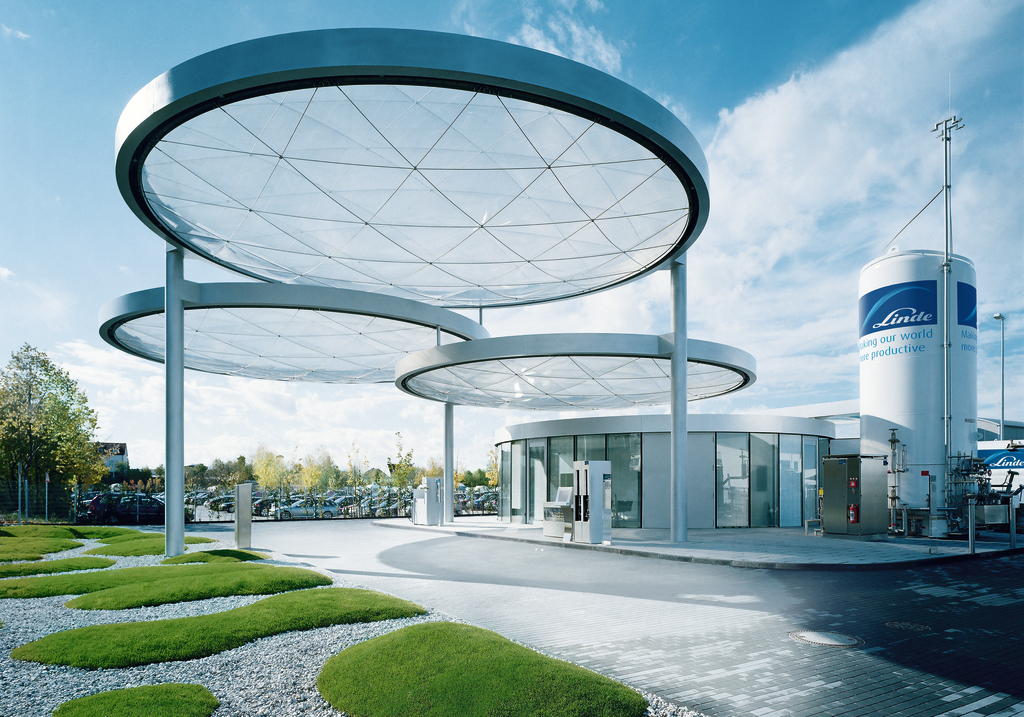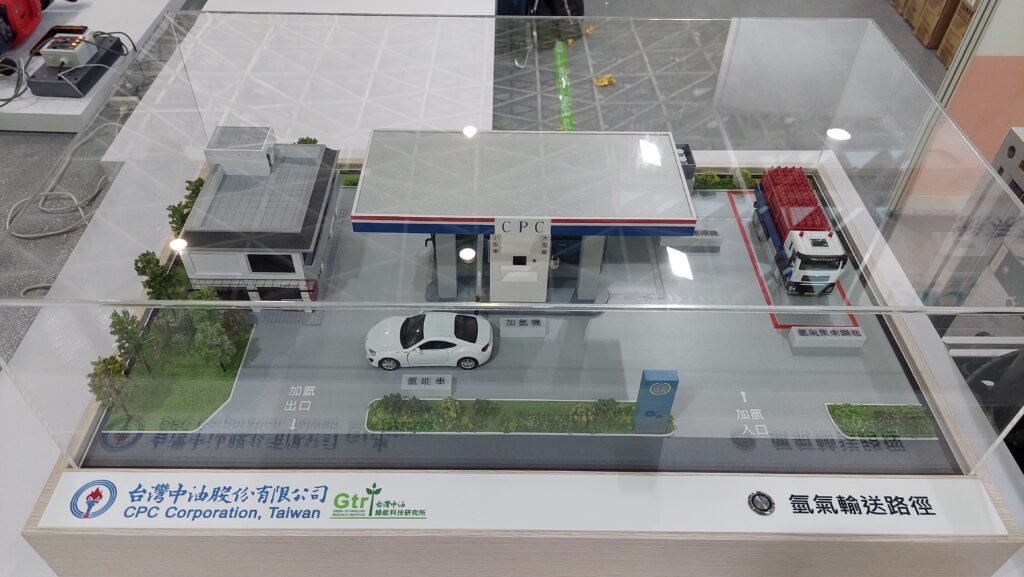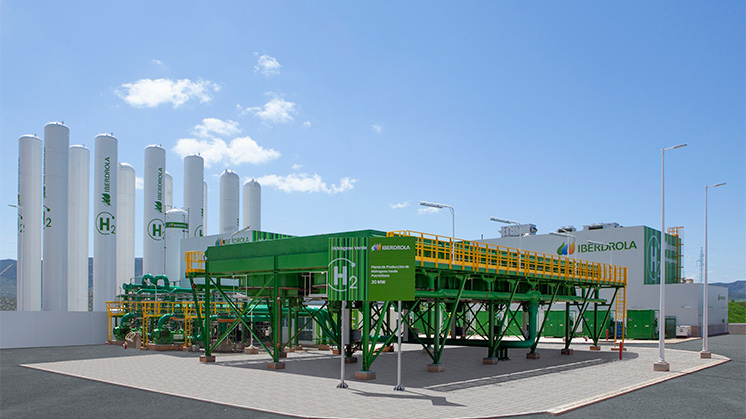HYDRO-CERTIFY
What we do
We provide:
* certified inspection of hydrogen refuelling forecourts that meets Government regulations and public expectations of safety.
Certified Inspection
To ISO Standards
As demand for hydrogen fuelled vehicles increases and more refuelling stations are built, forecourt companies will require annual safety inspections that meet both Taiwanese regulations and international standards for the safe application of these stations and transfer of hydrogen fuel from storage to vehicle tanks.
Our new service aims to provide certified inspection of hydrogen refuelling forecourts to meet the relevant laws, regulations, international standards, and safety protocols.
FOR MORE INFORMATION PLEASE CONTACT

Taiwan’s first hydrogen refuelling station is being built in the Southern Taiwan Science Park in Tainan.
(Above – a Linde hydrogen refuelling station in Germany)
Published:2022/05/31
(Taiwan News) — Taiwan’s first hydrogen refueling station will be built in the Southern Taiwan Science Park in Tainan.
Through a joint venture between industrial gases and engineering company Linde PLC and the Mitac-Synnex Group, Linde Lienhwa Industrial Gases (LLH) will begin construction on the station at their Tainan Tree Valley Park Industrial Zone site. LLH will build and operate the hydrogen filling station, which is slated to be ready for service in early 2023.
The proof of concept station will provide blue hydrogen for a full range of fuel cell vehicles that are expected to be introduced to Taiwan in the coming years. The station will initially be offered to the government and select customers to use for testing and validation.
LLH has been a major supplier of blue hydrogen for over 25 years, which is produced through steam-methane reforming. The process is able to capture more than 70% of the carbon dioxide created during the blue hydrogen production process through a carbon capture system, the company said.
Taiwan’s CPC Corporation plans hydrogen station expansion

Reporter Isabel Wang
Published:2023/11/13
(TVBS News) — In early November, the Ministry of Economic Affairs’ Energy Administration announced plans to establish hydrogen refueling stations. Alongside this decision, Taiwan’s state-owned CPC Corporation unveiled its intention to build the first hydrogen station in Kaohsiung.
The CPC’s initiative consists of three stages, beginning with the first hydrogen station serving as a demonstration site in the short term. This will enable the public to gain a deeper understanding of hydrogen’s benefits.
In the mid-term, CPC aims to align with Taiwan’s national policy of exclusively using electric buses by 2030, and will gradually expand the hydrogen station network to support various vehicles. The third phase of the initiative focuses on the comprehensive development of hydrogen applications.
Lu Kuo-hsu, head of the Green Technology Research Institute (GTRI), stated that the selected site, being in a less populated area, not only complies with regulations but also exceeds standards.
“We are working diligently to complete the construction by the end of 2023, or latest by mid-2024. During this time, we’ll focus on public engagement,” Lu added.
However, the high cost of hydrogen, ranging from NT$150 to NT$180 per kilogram, presents a challenge, as hydrogen-powered vehicles currently lack incentives when compared to electric vehicles.
Tseng Chung-jen, director of the Center for Energy Research at National Central University, highlighted that whether it involves burning hydrogen or using fuel cells for an electrochemical reaction, the process emits no pollutants.
The “12 Key Strategies of Taiwan’s 2050 Net-Zero Transition” report, released by the National Development Council in March 2022, identifies hydrogen energy as a critical strategy. The report anticipates the global hydrogen demand to reach 530 million tons by 2050.
As nations bolster their defenses against climate threats, hydrogen is poised to become a key alternative energy source for future generations.

Extensive hydrogen, fuel-cell battery supply chain enables Taiwan to work with global players
Reporter Annabelle Shu, Peng Chen
Published:2023/10/18
(DIGITIMES Asia) – The development of battery and fuel-cell EVs and their supply chain has been expedited in recent years. According to the Automotive Research and Testing Center (ARTC) in Taiwan, the country has seen its hydrogen supply chain grow to become more comprehensive and is poised to collaborate with global industry players.
ARTC said that Taiwan focuses on building infrastructure to produce and store hydrogen power, and the country has also set up several regulations. For example, the National Development Council said last year that it was working on enacting hydrogen-dedicated laws. The Ministry of Economic Affairs listed fuel cells in the Energy Administration Act earlier this year and announced regulations regarding the establishment of hydrogen refueling stations.
Taiwan has developed fuel-cell two-wheelers and has a comprehensive hydrogen and fuel-cell battery supply chain. The industry will gain more advantages and opportunities if the local hydrogen market can expand quickly.
According to ARTC, major fuel-cell EV models include Hyundai Motor’s Nexo and Toyota’s Mirai. Mercedes-Benz, Honda, China-based SAIC and GAC are also developing fuel-cell passenger EVs.
Taiwan-based Hotai Motor and industrial gas manufacturer Linde LienHwa have said fuel-cell vehicles will likely be commercialized first in the commercial segment. ARTC explained that battery trucks and other large commercial vehicles’ performance will be restricted as longer driving ranges require bigger and heavier batteries.
International automakers have transitioned their focus on fuel-cell EVs to commercial vehicles since 2020. For instance, Stellantis has put fuel-cell batteries into cars based on its EMP2 platform. Isuzu and Hyundai have also been developing large commercial vehicles powered by fuel cells.
ARTC said it takes time for BEVs to charge. Moreover, the size and weight of batteries also make BEVs more suitable for short-distance drives. Fuel-cell EVs can handle long-distance and long-time drives well. Logistics trucks, boats and ships, airplanes, and buses would be the ideal adopters of fuel-cells or fuel-cell hybrid technologies.
Portland Hydro-Certify
Working with forecourt refuelling businesses and Government departments to provide safe annually inspected and certified hydrogen refuelling installations around Taiwan since 2022.
